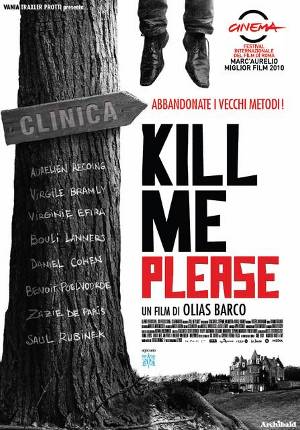At last the 2011 Fantastic Fest begins.
I managed to score tickets to all three movies I wanted to see today. Despite worries of a meltdown due to the potential of some 1500 people accessing the system at once, the online ticketing service worked perfectly. When I logged on I was 147 I in the queue and 15 minutes later I was good to go.
I could go on about the two t-shirts I got at the Festival, but let’s get on with the reason you are here: the movies.
My initial FF film, Let The Bullets Fly quickly establishes the picture’s exquisite tone from the opening sequence. A lone train car–steam spewing from it spout—being pulled by a team of horses along railroad tracks. After gunshots are exchanges, events quickly lead to an exaggerated comedic train derailment in the finest Chinese movie slapstick fashion. With 1920s China as the backdrop, screen legends Chow Yun Fat and Jiang Wen (who also directs and wrote the screenplay) deliver virtuoso performances as the power hungry, greedy gangster and the Robin Hood style bandit, respectively. The thinly veiled pro-Chinese Revolution story abounds with fun fight scenes, intriguing interactions, and as the title promises, abundant gunplay, all wrapped within the epic feel of a Sergio Leone western. The perfect beginning to this years festival.

Kill Me Please, a comedy centered around a Swiss euthanasia clinic, offers some fascinating and often humorous insights in the bleak world of assisted suicide, but ultimately falls short of greatness thanks to some inexplicable character actions late in the film. Director Olias Barco, who spoke after the movie, cites the Japanese attitude toward suicide as his inspiration and even visited an actual Swiss suicide clinic. Barco does an excellent job of demonstrating the absurdity of people who protest against assisted suicide actually killing those who run the place ala anti-abortion (“pro-life”) terrorists. Shot in b & w, Barco wrote only 45 page script, encouraging the actors (all excellent headlined by Aurélien Recoing and Saul Rubinek of Warehouse 13 fame) to improvise their scenes. Many of the revelations are surprisingly true.

This Brazilian import fails on the most essential aspect of the low budget movie: the script. While the inferior quality of the film stock, special effects, settings, and even the acting may all be forgiven, Pólvora Negra delivers a story littered with abundant plot hole and illogical character reactions—primarily framed to allow for stereotypical fight sequences. The magnetic star Nicolas Trevijano recalls favorably a younger and slimmer Hugh Jackman. While not a terrible movie, Pólvora Negra offers nothing new or better than its many revenge film predecessors.

Fantastic Fest Day Two: Extraterrestrial Cometh or Free Beer
